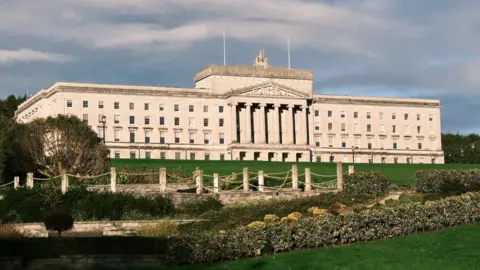Stormont on course for £450m overspend this year
 BBC
BBCStormont is on course for an overspend of £450m this year, the senior official in the Department of Finance has warned.
That figure is based on the assumption that there are no pay rises across public services.
Pay awards matching those in the rest of the UK would see the deficit balloon to around £1bn.
Stormont overspent by £300m last year, money to be paid back from additional Treasury funds awarded.
Neil Gibson, the permanent secretary at the Department of Finance, said that savings of £980m have been made this year.
Mr Gibson said public servants deserve a fair pay award and has previously spoken of his regret at the below inflation pay awards for civil servants this year.
However it is unclear what sort of pay awards will be on offer in the current financial climate.
Earlier this year, the head of Northern Ireland's civil service said Stormont officials were at the limit of what they could legally cut in the absence of ministers.
The Northern Ireland Secretary Chris Heaton-Harris has also ordered Stormont departments to consult on possible revenue raising measures.
The first consultation, launched this week, would see rates reliefs removed which would increase rates bills for some households and businesses.
'Needs-based focus'
However, it is highly unlikely that any of those measures could be in place in this financial year.
Northern Ireland politicians have been lobbying the government to ask for a change to the funding system which would see a greater 'needs-based' focus.

The executive's spending on public services is largely financed by a core block grant from Westminster, which evolves according to the Barnett Formula.
This ensures that when the government increases spending in the rest of the UK, the block grant rises by broadly the same amount in pounds per head in Northern Ireland.
For historic reasons, Northern Ireland has higher government spending per head than other parts of the UK.
However, that premium is falling and is set to continue falling in the coming decades.
That is happening for a combination of technical reasons and the end of temporary additional funding Northern Ireland received as the result of various political deals.
Spending per head is set to fall from 38% above equivalent UK spending in 2017-18 to 25% above in 2024-25 and about 20% by the end of the decade.
Some politicians suggest Northern Ireland could seek a similar agreement with the UK government to that reached by the Welsh government in 2016.
It set a floor under the block grant premium at an agreed estimate of relative need and an additional uplift to Barnett Formula increases to slow the rate at which the premium approaches the floor.
Mr Gibson suggested that if Northern Ireland currently had the Welsh funding model it would go a long way to tackling the crisis in Stormont's finances.
